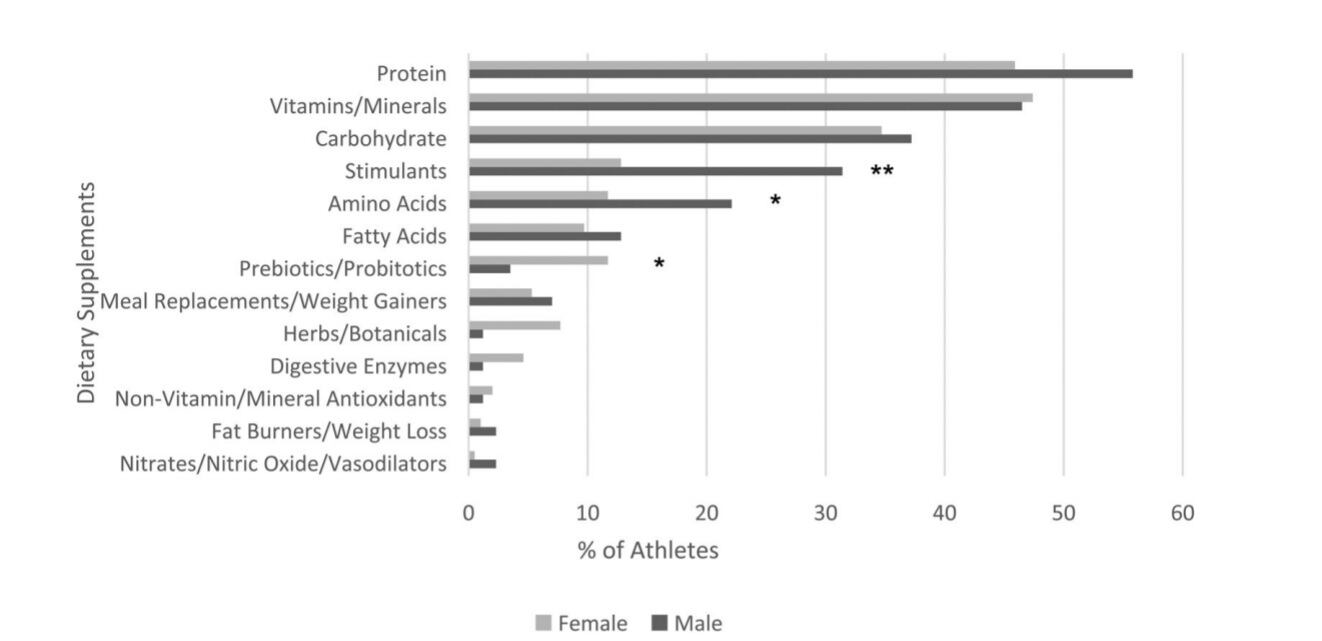Without such due diligence, athletes could be putting their health and careers on the line.
“Based on empirical data from the World Anti-Doping Agency, the International Court of Arbitration for Sport and National Anti-Doping organizations from Australia, the United Kingdom and the United States, 10-15% of dietary supplements were estimated to possibly contain prohibited substances,” said Dalia El Khoury, PhD RD Assistant Professor, Family Relations and Applied Nutrition, University of Guelph. “In Canada in particular, reports have also indicated that some dietary supplements are contaminated with undeclared substances and often ones prohibited by the World Anti-Doping Agency such as hormones, anabolic steroids and stimulants
To gain greater insight into dietary supplementation practices among athletes, El Khoury and her research team at the University of Guelph, Guelph, Ontario, Canada ran a study to gauge what athletes are taking, the reasoning behind their choices and where they get their information from.
The study
The study included 302 college athletes made up of 30.5% male and 69.5% female with a median age of 20.5. The participants represented in the sample included 125 athletes involved in intermittent sports, 79 in endurance sports and 96 in power sports at the University of Guelph.
The participants were asked to complete an online questionnaire regarding dietary supplement consumption, frequency of use and reasons for use. The survey was broken down into three sections: Physical activity patterns, dietary supplements and demographics.
Findings
Overall, 58% of athletes reported having used at least one type of dietary supplement in the past six months.
Gender and age had significant associations with prevalence of supplement use, with 66% of male athletes using supplements compared to 53% of female athletes.
Age was also found to play a role, with a 66% of athletes over 20-year old using dietary supplements compared to 49% of athletes aged 20 and younger.
Types
Overall, the types of supplements most commonly consumed by varsity athletes were protein at 48.7%,vitamins and minerals at 48% and carbohydrate supplements at 36%.
Gender, age and type of sport practiced all had significant associations with what types of supplements athletes were using.

Female athletes were significantly more likely to consume prebiotics and probiotics (11.7% vs. 3.5%), while male athletes were more likely to consume amino acids supplements (22.1% vs. 11.7%) and stimulants (31.4% vs. 12.8%).
Athletes over 20-year old were also more likely to use protein (58.3% vs. 41%), carbohydrates (45.5% vs. 26.4%) and stimulants (25.8% vs. 11.8%) compared to younger athletes.
Frequency
Training hours and type of sport practiced were both found to have an impact on the frequency of supplement use. As weekly training hours increased, a higher percentage of athletes were using at least one type of supplement 6 times weekly. This includes:
Nearly 36% of athletes training 10 hours per week, 40.5% of athletes training 11–15 hours per week, 52% of athletes training 16–20 hours per week and 60% of athletes training 21 hours per week.
Reasons
The most frequently reported reasons for consuming dietary supplements were to maintain
good health, increase energy, promote recovery, correct or prevent micronutrient deficiencies and supply convenient forms of energy and/or macronutrients.
Sources of information
The most common sources of supplement-related information for supplement users were health care professionals (59.2%), friends/family (53.4%), the internet (48.3%), their own judgment (48.3%), teammates/training partners (44.8%) and coaches (39.1%).
Although most athletes were using reliable sources of information such as health care professionals, 58.6% still reported that they wanted to become more knowledgeable about dietary supplements.
El Khoury said the lack of nutrition training among doctors is an international problem. “There is generally lack of training, knowledge, skills, and (or) confidence for medical doctors to counsel patients on nutrition-related matters. In a study of Canadian medical students at 9 universities across Canada, 87.2% indicated that their programs should dedicate more time to nutrition education,” she said.
To address this education gap, El Khoury said, “Researchers, in collaboration with healthcare professionals including sports doctors and dietitians, have to design nutrition education intervention programs targeting specific populations in which large gap in knowledge/awareness on dietary supplements (and their efficacies and risks) is seen and might put them at risk including but not limited to university student athletes. Our research team is currently working on designing and implementing a nutrition education program focused on dietary supplements targeting athletes at different universities across Canada.”
Source: Journal of Dietary Supplements
29 Sep 2020 doi.org/10.1080/19390211.2020.1826618
“Dietary Supplementation Practices among Varsity Athletes at a Canadian University”
Authors: K. Roy et al.




